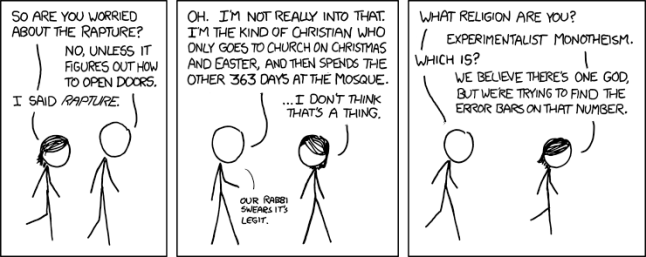So, after 2 years of work, the Commission on RE have published their final report and a series of recommendations. I am sure that a lot of time, effort and hard work went into this report and those involved should be thanked for their commitment to RE. Having read the report and considered the recommendations, I thought I would summarise my thoughts here (thanks to Chris Giles for encouraging me to do so, my tl;dr version was ‘it’s a missed opportunity and some of the suggestions are just distracting from the real issues’).
Firstly, there are many recommendations which I feel are a positive for the RE community. Recommendations 3&4, which seek to establish a national ‘entitlement’ and eliminate the need for SACREs to be involved in curriculum development would be a huge step forward. It would allow for consistency of content across the country (with some regional variations where appropriate) which would allow the RE community to be (even) more supportive of each other, and would also eliminate the fairly daft notion that a child in Suffolk should learn a totally different RE curriculum from one in Cornwall or London or Carlisle. I welcome the suggestion that a group should be formed to develop a national entitlement to a religion curriculum.
Recommendations 6&7 which seek to enhance the ITE offer and the CPD available would obviously be welcomed, and if SACREs need to exist (I would argue they don’t!) then a role akin to that in recommendation 8 is a good idea.
Recommendation 11 is a real missed opportunity. The RE community is crying out for an end to the right to withdraw from RE, which is a hangover from the days of RI and has no place in a modern, diverse subject. I think the commission could have been much more assertive in their wording here, and not just asked the DfE to ‘review’ the right to withdrawal. We need the RE community to challenge the idea that parents can simply take their children out of all (or part) of our subject, something that we would never see happen in maths or English.
The heart of the report, though, is recommendations 1 and 2, which seek to change the subject name (to Religion and Worldviews), and then states 9 areas which pupils must be taught. I absolutely despair every time the ‘what should we call the subject’ debate is raised (and believe me, it is raised a lot), and have sat through many discussions at school, conferences, meetings, networks, etc about the name of the subject. This is the second suggestion this year on a new name for the subject, this time seeking to ‘add’ worldviews to religion (are religions not worldviews?).
If we examine this further, it is clear that at its root is the desire to make far more explicit the need for us to teach more about non-religious worldviews. There are many issues with this. First, there is the perennial discussion about what our subject is for; knowing more about religion and its impact through history, or looking at what different people believe today and why. I would strongly argue that you cannot do the latter without the former, and that we don’t do the former well enough (yet) to allow us to do justice to the latter – certainly not until late in KS4 or even KS5. We are not going to get more curriculum time, so every lesson I have to include on humanism/atheism/nihilism/whatever has an opportunity cost, meaning I can’t develop the religious knowledge and understanding of the students I teach. Furthermore, the issue of the content of lessons on these ‘worldviews’ is always present…what content do we need to deliver? There simply is not the same volume of history, sources of wisdom and so on as with the religions we study (this obviously does not mean things that humanists have done are not worthy of study. But in RE?). Studying the NRWVs in RE is always a reaction to the religion being studied, rather than core content on its own; you need to know a lot about religion before you can get academically near the other worldviews in any meaningful way. Reading some of the report, it almost seems that we are lucky the word religion got in at all! (‘What have you got later?’. ‘Worldviews. Miss says we are doing communism or something.’)
The suggestions that we also need to have the new GCSE and A level specs reviewed in light of the national entitlement also saddens me. ONE cohort has gone through these courses, and they have been sniped at from the start. These courses develop a much deeper understanding of a lot of issues to do with religion and belief and should be supported, it is unhelpful for the commission to imply that their content needs to be altered whilst we are still analysing lessons to be learned from the first cohort of students.
Finally, with regard to asking the DfE to review the impact of RS not being in the EBacc (recommendation 10)…this is a waste of time. We aren’t going to be in the EBacc whilst we are a compulsory subject, so if we want to campaign to be included we probably need to accept being optional after KS3. And, as ever, we should be careful what we wish for.
